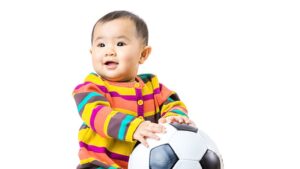Providing extracurricular activities for your preschooler can encourage their natural curiosity and love of learning. It can also help them develop important skills like self-awareness, social development, language, and motor skills. There are countless classes and programs available for your child that are both fun and educational, but which activity is right for your child?
Team Sports
Team sports help kids with their social development, as well as problem-solving skills. Being part of a team also gives kids a sense of confidence as they have the opportunity to cheer each other on and contribute to the common goal. “Soccer seems to be a good place to start. It gets them used to the idea of team sports.” says Kara Thomas, mom and preschool teacher. Another preschool-friendly team sport is T-ball. Team sports are a good fit for your child if they love physical activity and socializing with other kids.
Art
An art class provides the opportunity for kids to create, make messes, and try crafts that their parents may not want to try at home such as painting and sculpture. Art helps develop hand-eye coordination, fine motor skills, and encourages kids to explore different colors, textures while encouraging their creativity. Kids who are introverted, creative, and can sit still for longer periods of time would enjoy an art class.
Music and Dance
Preschool kids love to listen to music and dance. There are many programs available that offer enrichment in music where kids are encouraged to sing, make their own music, and use their bodies to express themselves through dance. Many dance studios offer beginner classes for the preschool crowd. The study of music and dance helps kids develop their gross motor skills, language, and even improve their math and reading skills down the line. (www.pbs.org) Music classes are a good fit for any preschooler but kids who are naturally drawn to music and movement, in particular, should look into music classes such as Gymboree or Music with Mar which is geared towards preschool children specifically.
Preschool and Playgroups
Traditional preschool exposes children to many different types of enrichment such as art, music, games, cooperative play, drama/pretend play, as well as social and language skills. While preschool may provide a well-rounded enrichment experience, it may not be a good fit for some families due to schedules or finances. Playgroups are another great way to expose your child to many types of enrichment experiences while giving them the social aspect that many preschools provide.
Individual Sports
“I think dance or tumbling is a really good first organized activity for kids,” says Angela Leever, mom of three and preschool special education teacher. “You want to make sure you get them into an activity where the instructors are used to working with young children and their expectations are age appropriate.”
Gymnastics, swimming and martial arts are great sports activities for little ones to try because they work on their core strength and confidence. Kids who love to be active and are maybe even a little daring do great in these individual sports.
The wonderful thing about preschool enrichment is that there are several programs and opportunities, and there also are countless chances to expose your kids to learning at home as well, such as gardening and cooking.
Kids can learn by helping with chores around the house, exploring parks and museums and even visiting the local library. Get creative, make learning fun, and allow your child to explore and try new things both in organized programs and at home.
Preschool Enrichment at Home
You do not have to spend a fortune on classes to give your kids great enrichment experiences. Here are some ideas to incorporate at home or explore in your community.
- Gross motor skills: visit a park, play in the backyard, create an obstacle course using household objects, or have a family dance party
- Fine motor skills: create a sensory bin, play with puzzles or blocks, allow your kids to draw and practice with scissors
- Language: sing, read, and use cooperative play
- Social development: host playdates, explore the city, go on a scavenger hunt
- Self-awareness: dress up, cook, have them help with chores and gardening
Sarah Lyons is a freelance writer.





